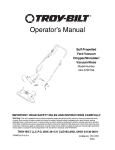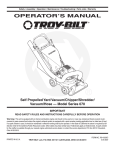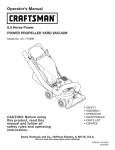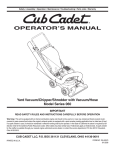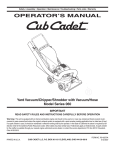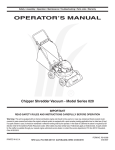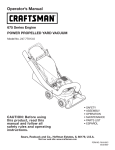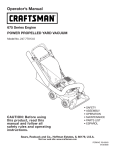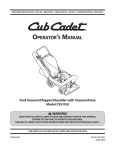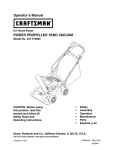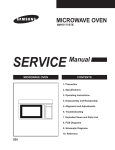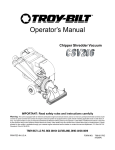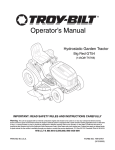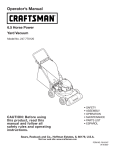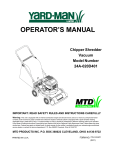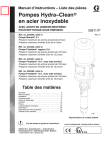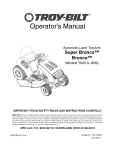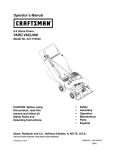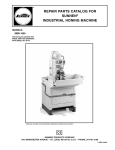Download Troy-Bilt 24A-070F768 User's Manual
Transcript
Safety • Assembly • Operation • Maintenance • Troubleshooting • Parts Lists • Warranty OPERATOR’S MANUAL Self Propelled Yard Vacuum/Chipper/Shredder/ Vacuum/Hose — Model 24A-070F766 IMPORTANT READ SAFETY RULES AND INSTRUCTIONS CAREFULLY BEFORE OPERATION Warning: This unit is equipped with an internal combustion engine and should not be used on or near any unimproved forest-covered, brushcovered or grass-covered land unless the engine’s exhaust system is equipped with a spark arrester meeting applicable local or state laws (if any). If a spark arrester is used, it should be maintained in effective working order by the operator. In the State of California the above is required by law (Section 4442 of the California Public Resources Code). Other states may have similar laws. Federal laws apply on federal lands. A spark arrester for the muffler is available through your nearest engine authorized service dealer or contact the service department, P.O. Box 361131 Cleveland, Ohio 44136-0019. PRINTED IN U.S.A. TROY BILT LLC, P.O. BOX 361131 CLEVELAND, OHIO 44136-0019 FORM NO. 769-01295A 6/27/2005 This Operator’s Manual is an important part of your new yard vacuum. It will help you assemble, prepare and maintain the unit for best performance. Please read and understand what it says. Table of Contents Customer Support .............................................. 2 Safety Labels ...................................................... 3 Safe Operation Practices ................................... 4 Setting Up Your Yard Vacuum ............................ 6 Operating Your Yard Vacuum ........................... 10 Maintaining Your Yard Vacuum ........................ 14 Troubleshooting................................................ 18 Parts List ........................................................... 20 Warranty ............................................ Back Cover Finding and Recording Model Number BEFORE YOU START ASSEMBLING YOUR NEW EQUIPMENT, please locate the model plate on the equipment and copy the information to the sample model plate provided to the right. You can locate the model plate by standing behind the unit and looking down at the frame below the engine. This information will be necessary to use the manufacturer’s web site and/or obtain assistance from the Customer Support Department or an authorized service dealer. www.troybilt.com TROY-BILT LLC P. O. BOX 3 6 1 1 3 1 CLEVELAND, OH 44136 330-558-7220 1-800-520-5520 Customer Support Please do NOT return the unit to the retailer from which it was purchased, without first contacting Customer Support. If you have difficulty assembling this product or have any questions regarding the controls, operation, or maintenance of this unit, you can seek help from the experts. Choose from the options below: 1. Visit troybilt.com. Click on Customer Service at the bottom of the page. 2. Phone a Customer Support Representative at 1 (800) 520-5520. 3. The engine manufacturer is responsible for all engine-related issues with regards to performance, power-rating, specifications, warranty and service. Please refer to the engine manufacturer’s Owner’s/Operator’s Manual, packed separately with your unit, for more information. 2 1 Safety Labels ������ ����������������������� �� ����������������������� �� �������������������������������������������������������������� ���������������������������������������� �� ����� ������� ���� ���� ������ ��������� ��� ����� ��� ��������� ����� �������������������� �� �������������������������������������������������������������� �� ��� ���� �������� ����� �������� ���� ��� ��������� ������� ������ ��� ������ �� ������������������������������������������������������������������������� � ���������������������������������������������������������� �� �������������������������������������������������� �� ���������������������������������������� ������ ���� � � � � � � � � � � � � � � � � � � � � � ���� ������ ������� ��� � � � � � � � � � � � � ��� � � � � � � � ��������������� ������ WARNING This symbol points out important safety instructions which, if not followed, could endanger the personal safety and/or property of yourself and others. Read and follow all instructions in this manual before attempting to operate this machine. Failure to comply with these instructions may result in personal injury. When you see this symbol. HEED ITS WARNING! Your Responsibility Restrict the use of this power machine to persons who read, understand and follow the warnings and instructions in this manual and on the machine. 3 2 Safe Operation Practices WARNING This symbol points out important safety instructions which, if not followed, could endanger the personal safety and/or property of yourself and others. Read and follow all instructions in this manual before attempting to operate this machine. Failure to comply with these instructions may result in personal injury. When you see this symbol. WARNING: Engine Exhaust, some of its constituents, and certain vehicle components contain or emit chemicals known to State of California to cause cancer and birth defects or other reproductive harm. DANGER: This machine was built to be operated according to the rules for safe operation in this manual. As with any type of power equipment, carelessness or error on the part of the operator can result in serious injury. This machine is capable of amputating hands and feet and throwing objects. Failure to observe the following safety instructions could result in serious injury or death. Training Preparation 1. Read, understand, and follow all instructions on the machine and in the manual(s) before attempting to assemble and operate. Keep this manual in a safe place for future and regular reference and for ordering replacement parts. 2. Be familiar with all controls and their proper operation. Know how to stop the machine and disengage them quickly. 3. Never allow children under 16 years old to operate this machine. Children 16 years old and over should read and understand the operation instructions and safety rules in this manual and should be trained and supervised by a parent. 4. Never allow adults to operate this machine without proper instruction. 5. Keep bystanders, helpers, pets, and children at least 75 feet from the machine while it is in operation. Stop machine if anyone enters the area. 6. Never run an engine indoors or in a poorly ventilated area. Engine exhaust contains carbon monoxide, an odorless and deadly gas. 7. Do not put hands and feet near rotating parts or in the feeding chambers and discharge opening. Contact with the rotating impeller can amputate fingers, hands, and feet. 8. Never attempt to unclog either the feed intake or discharge opening, remove or empty vacuum bag, or inspect and repair the machine while the engine is running. Shut the engine off and wait until all moving parts have come to a complete stop. Disconnect the spark plug wire and ground it against the engine. 1. Thoroughly inspect the area where the equipment is to be used. Remove all rocks, bottles, cans, or other foreign objects which could be picked up or thrown and cause personal injury or damage to the machine. 2. Always wear safety glasses or safety goggles during operation or while performing an adjustment or repair, to protect eyes. Thrown objects which ricochet can cause serious injury to the eyes. 3. Wear sturdy, rough-soled work shoes and close-fitting slacks and shirts. Loose fitting clothes or jewelry can be caught in movable parts. Never operate this machine in bare feet or sandals. Wear leather work gloves when feeding material in the chipper chute. 4. Before starting, check all bolts and screws for proper tightness to be sure the machine is in safe working condition. Also, visually inspect machine for any damage at frequent intervals. 5. Maintain or replace safety and instructions labels, as necessary. 6. To avoid personal injury or property damage use extreme care in handling gasoline. Gasoline is extremely flammable and the vapors are explosive. Serious personal injury can occur when gasoline is spilled on yourself or your clothes which can ignite. Wash your skin and change clothes immediately. a. Use only an approved gasoline container. b. Extinguish all cigarettes, cigars, pipes, and other sources of ignition. c. Never fuel machine indoors. d. Never remove gas cap or add fuel while the engine is hot or running. e. Allow engine to cool at least two minutes before refueling. f. Never over fill fuel tank. Fill tank to no more than 1/2 inch below bottom of filler neck to provide space for fuel expansion. g. Replace gasoline cap and tighten securely. h. If gasoline is spilled, wipe it off the engine and equipment. Move machine to another area. Wait 5 minutes before starting the engine. i. Never store the machine or fuel container inside where there is an open flame, spark, or pilot light (e.g. furnace, water heater, space heater, clothes dryer, etc.). j. To reduce a fire hazard, keep machine free of grass, leaves, or other debris build-up. Clean up oil or fuel spillage and remove any fuel soaked debris. k. Allow machine to cool at least 5 minutes before storing. HEED ITS WARNING! Your Responsibility Restrict the use of this power machine to persons who read, understand and follow the warnings and instructions in this manual and on the machine. 4 Operation Maintenance & Storage 1. Do not put hands and feet near rotating parts or in the feeding chambers and discharge opening. Contact with the rotating impeller can amputate fingers, hands, and feet. 2. Before starting the machine, make sure the chipper chute, feed intake, and cutting chamber are empty and free of all debris. 3. Thoroughly inspect all material to be shredded and remove any metal, rocks, bottles, cans, or other foreign objects which could cause personal injury or damage to the machine. 4. If the impeller strikes a foreign object or if your machine should start making an unusual noise or vibration, immediately shut the engine off. Allow the impeller to come to a complete stop. Disconnect the spark plug wire, ground it against the engine and perform the following steps: a. Inspect for damage. b. Repair or replace any damaged parts. c. Check for any loose parts and tighten to assure continued safe operation. 5. Do not allow an accumulation of processed material to build up in the discharge area. This can prevent proper discharge and result in kickback of material through the feed opening. 6. Do not attempt to shred or chip material larger than specified on the machine or in this manual. Personal injury or machine damage could result. 7. Never attempt to unclog either the feed intake or discharge opening while the engine is running. Shut the engine off, wait until all moving parts have stopped, disconnect the spark plug wire and ground it against the engine before clearing debris. 8. Never operate without vacuum bag and discharge chute properly attached to the machine. Never empty or change vacuum bag while the engine is running. Zippered end of vacuum bag must be kept closed at all times during operation. 9. Never operate without either the inlet nozzle or optional hose attachment properly attached to the machine. Never attempt to attach or change either attachment while the engine is running. 10. Keep all guards, deflectors and safety devices in place and operating properly. 11. Keep your face and body back and to the side of the chipper chute while feeding material into the machine to avoid accidental kickback injuries. 12. Never operate this machine without good visibility or light. Always be sure of your footing and keep a firm hold on the handles. 13. Do not operate this machine on a gravel surface. 14. Do not operate this machine while under the influence of alcohol or drugs. 15. Muffler and engine become hot and can cause a burn. Do not touch. 16. Never pick up or carry machine while the engine is running. 1. Never tamper with safety devices. Check their proper operation regularly. 2. Check bolts and screws for proper tightness at frequent intervals to keep the machine in safe working condition. Also, visually inspect machine for any damage and repair, if needed. 3. Before cleaning, repairing, or inspecting, stop the engine and make certain the impeller and all moving parts have stopped. Disconnect the spark plug wire and ground it against the engine to prevent unintended starting. 4. Do not change the engine governor settings or overspeed the engine. The governor controls the maximum safe operating speed of the engine. 5. Maintain or replace safety and instruction labels, as necessary. 6. Follow this manual for safe loading, unloading, transporting, and storage of this machine. 7. Never store the machine or fuel container inside where there is an open flame, spark or pilot light such as a water heater, furnace, clothes dryer, etc. 8. Always refer to the operator’s manual for proper instructions on off-season storage. 9. If the fuel tank has to be drained, do this outdoors. 10. Observe proper disposal laws and regulations for gas, oil, etc. to protect the environment. Do not modify engine To avoid serious injury or death, do not modify engine in any way. Tampering with the governor setting can lead to a runaway engine and cause it to operate at unsafe speeds. Never tamper with factory setting of engine governor. Notice regarding Emissions Engines which are certified to comply with California and federal EPA emission regulations for SORE (Small Off Road Equipment) are certified to operate on regular unleaded gasoline, and may include the following emission control systems: Engine Modification (EM) and Three Way Catalyst (TWC) if so equipped. Your Responsibility Restrict the use of this power machine to persons who read, understand and follow the warnings and instructions in this manual and on the machine. 2 Safe Operation Practices WARNING This symbol points out important safety instructions, which if not followed, could endanger the personal safety and/or property of yourself and others. Read and follow all instructions in this manual before attempting to operate this machine. Failure to comply with these instructions may result in personal injury. When you see this symbol. HEED IT’S WARNING! Your Responsibility Restrict the use of this power machine to persons who read, understand and follow the warnings and instructions in this manual and on the machine. 5 3 Setting Up Your Yard Vacuum IMPORTANT: This unit is shipped without gasoline or oil in the engine. Be certain to service engine with gasoline and oil as instructed in the separate engine manual before operating your machine. ������������ ������ ������� ������ ������� NOTE: Reference to right and left hand side of the Yard Vacuum is observed from the operating position. Opening Carton 1. Cut each corner of the carton vertically from top to bottom. ������������ 2. Remove all loose parts. 3. Remove loose packing material. Removing Unit From Carton 1. Lift unit from the rear to detach it from underlying carton material and roll unit out of carton. 2. Check carton thoroughly for any other loose parts. IMPORTANT This unit is shipped without gasoline or oil in the engine. Be certain to service engine with gasoline and oil as instructed in the separate engine manual before operating your machine. NOTE: Reference to right and left hand side of the Yard Vacuum is observed from the operating position. ��� NOTE: Make sure not to crimp cables while removing loose parts or the entire unit from the carton. Loose Parts In Carton (See Figure 1) a. Upper and Lower Handle b. Hose Assembly ����� �������� �������������� c. Safety Glasses d. Engine Oil (May be located in bag) ������������� e. Bag �������������������� f. Blower Chute (If Equipped) g. Operator’s Manual ����������������� ������������ Figure 1 6 3 Attaching The Handle 1. Remove the hairpin clips from the handle brackets and remove the carriage screws and wing nuts from the lower handle. a. Place the bottom holes in lower handle over the pins on the handle brackets and secure with hairpin clips. See Figure 2. b. Insert carriage screws through upper hole in lower handle from the inside and secure with wing nuts. See Figure 2. Setting Up Your Yard Vacuum � 2. a. Unfold the upper handle until it aligns with lower handle. Make sure the rope guide is on the right side of upper handle. See Figure 3. � IMPORTANT: Make sure the cables are routed outside the lower handle. Also, do not crimp the cables while lifting up the handles. Figure 2 b. Secure the two handles by tightening the handle knobs (carriage bolts must be seated properly into the handle). See Figure 3. 3. Pull the two cable ties attached to the cables tight approximately 8 inches from each cable end and place the cables into the cable guide. IMPORTANT Make sure the cables are routed outside the lower handle. Also, do not crimp the cables while lifting up the handles. ���������� 4. Loosen the wing nut that secures the rope guide to the right side of upper handle. a. Pull the starter rope out of the engine slowly. See Figure 4. � b. Slip the starter rope into the rope guide. Tighten the wing nut. See Figure 4. � Attaching The Hose Assembly 5. a. Slide hose adapter of hose assembly into the base adapter located on the left front of the Yard Vacuum. See Figure 5. b. Pull spring loaded pin out on the base and align pin with the first hole (closest to the end of the tube) in the hose adapter. c. Release the pin to lock the hose in place. Figure 3 � � � ���������� ���������� ����� � Figure 4 Figure 5 7 3 Setting Up Your Yard Vacuum 6. a. Snap the hose handle first into the upper hose handle bracket and then into the lower hose handle bracket. See Figure 6. b. Lay hose tubing on hanger bracket next to chipper chute. Attaching The Bag 7. Grasp bag handle with one hand and slide locking rod on mounting bracket with other hand toward engine. Use the end of mounting bracket as leverage when sliding the locking rod. � a. Slip bag over the rim of the discharge opening and release locking rod to secure bag in place. See Figure 7. � b. Snap bag clip to the top of the lower handle. c. Place the lower straps on the bag over the top of lower handle, hooking them on the studs. See Figure 7. Figure 6 NOTE: The bag/chute switch button attached to the mounting bracket must be fully depressed by the tip of front tab on bag handle when securing the bag or engine will not start. NOTE: The bag/chute switch button attached to the mounting bracket must be fully depressed by the tip of front tab on bag handle when securing the bag or engine will not start. � � � Figure 7 8 3 Attaching The Blower Chute (If Equipped) NOTE: The bag must be removed before installing the blower chute. 8. a. Grasp blower chute with one hand and slide locking rod on mounting bracket with other hand toward engine. Use the end of mounting bracket as leverage when sliding the locking rod. See Figure 8. b. Slip blower chute over rim of discharge opening and release locking rod to secure chute in place. c. Raise the nozzle height to the highest setting when using the blower chute. Refer to nozzle height adjustment in the MAINTENANCE section on page 16. Setting Up Your Yard Vacuum � � NOTE: The bag/chute switch button attached to the mounting bracket must be fully depressed by the tip of front tab on the blower chute or engine will not start. Figure 8 9 NOTE: The bag must be removed before installing the blower chute. 4 Know Your Yard Vacuum ������������� ������� ������ ������������� ������������� ��� Operating Your Yard Vacuum ���������� �������� ���� �������� ������������� ���� ������ WARNING The operation of any chipper shredder can result in foreign objects being thrown into the eyes, which can damage your eyes severely. Always wear the safety glasses provided with this unit or eye shields while operating or while performing any adjustments or repairs. ���������� ���� ������������� ������������ ����������� ��������� ������ ������������� ���������������� Figure 9 Speed Control Now that you have set up your yard vacuum for operation, get acquainted with its controls and features. Located on the left side of the upper handle, the speed These are described below and illustrated on this page. control is used to select the forward speed of the yard vacuum. This knowledge will allow you to use your new equipment to its fullest potential. IMPORTANT: Move the speed control only when the engine is running. Changing the speed control setting WARNING: The operation of any with the engine off can damage the yard vacuum. chipper shredder can result in foreign objects being thrown into the eyes, Nozzle Height Adjustment Lever which can damage your eyes severely. Always wear the safety glasses Used to adjust the nozzle ground clearance ranging approximately from 5/8” to 4 1/8”. See Figure 9. provided with this unit or eye shields while operating or while performing Throttle Control Lever (Not Shown) any adjustments or repairs. The throttle control lever is located on the engine. It controls the engine’s speed and stops the engine. See separate engine manual packed with unit for details. Chipper Chute Allows twigs and small branches up to 1-1/2” in diameter Engine Controls See the separate engine manual for the location and to be fed into the impeller for chipping. See Figure 9. function of the controls on the engine. Drive Control Located on the underside of the upper handle, the drive Nozzle Yard waste such as leaves or pine needles can be control is used to engage/disengage wheels. Fully vacuumed up through the nozzle for shredding. squeeze the drive control against the upper handle to engage the wheels; release to disengage. (DO NOT slip clutch). 10 Starting Engine Hose Assembly Used as an alternative to the nozzle to vacuum yard waste such as leaves or pine needles in hard to reach places. See Figure 9. 1. Attach spark plug wire to spark plug. Make certain the metal cap on the end of the spark plug is fastened securely over the metal tip on the spark plug. Nozzle/ Hose Vac Lever The nozzle/hose vac handle is located on top of the nozzle. Use it to switch vacuum suction between the nozzle and the hose assembly. 2. Make sure safety switch wire is connected to engine and properly grounded. 3. Engines with choke lever: Hose Handle Used to guide hose assembly when vacuuming. Move choke lever on engine to CHOKE position. (A warm engine may not require choking). Bag Handle Used to grasp bag in order to assist in attaching, removing, and emptying bag. See Figure 9. Engines with primer: Prime engine as instructed in separate engine manual. 4 Operating Your Yard Vacuum 4. The throttle control is located on the engine. Move engine throttle control lever to FAST or ON position. Bag Collects shredded material fed through the chipper chute or vacuumed through the nozzle or hose. 5. Stand behind unit, grasp starter handle and pull rope out slowly until engine reaches start of compression cycle (rope will pull slightly harder at this point). Blower Chute When attached to unit, the blower chute is used to blow or scatter yard waste such as leaves, pine needle, or small twigs across yard. 6. Pull rope with a rapid, continuous, full arm stroke. Keep a firm grip on starter handle. Let rope rewind slowly. WARNING: The operation of the Yard Vacuum can result in foreign objects being thrown into the eyes, which can damage your eyes severely. Always wear the safety glasses provided with this unit or eye shields before chipping or blowing and while performing any adjustments or repairs. 7. Repeat previous steps until engine fires. When engine starts, move choke control (if equipped) gradually to RUN position. WARNING: Never run the engine indoors or in a poorly ventilated area. Engine exhaust contains carbon monoxide, an odorless and deadly gas. Gas And Oil Fill-Up Service the engine with gasoline and oil as instructed in the separate engine manual packed with your Yard Vacuum. Read instructions carefully. Stopping Engine 1. Move throttle control lever to STOP or OFF position. WARNING: Never fill fuel tank indoors with engine running or until the engine has been allowed to cool for at least two minutes after running. 2. Disconnect spark plug wire from spark plug and ground against the engine. 11 WARNING Never fill fuel tank indoors with engine running or until the engine has been allowed to cool for at least two minutes after running. Never run the engine indoors or in a poorly ventilated area. Engine exhaust contains carbon monoxide, an odorless and deadly gas. To Empty Bag 4 � Operating Your Yard Vacuum � 1. a. Unhook bag straps from the lower handle. b. Unsnap bag clip from the top of lower handle. See Figure 10. c. Grasp bag handle with one hand and pull lock rod on mounting bracket with other hand toward engine to release. d. Lift bag off back of unit. 2. Twist the two buttons on the back of the bag to unlock and empty contents. See Figure 11. Hold bag handle and bag clip while emptying the contents. 3. Compress bag opening and fold inner flap over opening. 4. Fold outer flap over inner flap and insert buttons on the bag through metal outlets. See Figure 11. � 5. Twist the buttons to lock bag. Place bag back onto unit as instructed on page 8. � To Remove Blower Chute Figure 10 1. Grasp blower chute with one hand and pull lock rod on mounting bracket with other hand toward engine to release. Refer to Figure 8 on page 9. IMPORTANT Move the speed control only when the engine is running. Changing the speed control setting with the engine off can damage the yard vacuum. 2. Remove blower chute from rim of the discharge opening. Using The Nozzle Vacuum 1. Place nozzle/hose vac lever in the top position on the nozzle to vacuum through nozzle. See Figure 12. ������� ������ ���� ���������� 2. The spring loaded pin must be in the first hole (closest to the end of the tube) of the hose adapter to operate the nozzle vac. 3. Place both hands on top of the upper handle and fully lift the drive control against the upper handle to propel the unit over yard. 4. Use the speed control to choose either the high or low speed. The speed control may be moved either while the unit is propelling or before engaging the wheels. Figure 11 IMPORTANT: Move the speed control only when the engine is running. Changing the speed control setting with the engine off can damage the yard vacuum. � � Figure 12 12 Yard waste such as leaves and pine needles can be vacuumed up through the nozzle for shredding. After material has been shredded by the flail blades on the impeller assembly, it will be discharged into catcher bag or through blower chute. Do not attempt to shred or chip any material other than vegetation found in a normal yard (i.e. branches, leaves, twigs, etc.) Avoid fibrous plants such as tomato vines until they are thoroughly dried out. Materials such as stalks or heavy branches up to 1-1/2” in diameter may be fed into the chipper chute. � � 4 Operating Your Yard Vacuum WARNING: Do not attempt to shred, chip, or vacuum any material larger than specified on the machine or in this manual. Personal injury or damage to the machine could result. Figure 13 IMPORTANT: The flail screen is located inside the housing in the discharge area. If the flail screen becomes clogged, remove and clean as instructed in the Maintenance section on page 16. For best performance, it is also important to keep the chipper blade sharp. WARNING WARNING: Do not at any time make any adjustments without first stopping engine and disconnecting spark plug wire. Do not attempt to shred, chip, or vacuum any material larger than specified on the machine or in this manual. Personal injury or damage to the machine could result. Using The Hose Assembly 1. Place nozzle/hose vac handle in the bottom position on the nozzle to redirect vacuum to the hose assembly. See Figure 13. 2. The spring loaded pin must be in the second hole of the hose adapter to operate the hose assembly. 3. Unhook the hose from upper handle bracket and grasp the hose handle to guide while vacuuming yard waste such as leaves or pine needles in hard to reach places. Do not at any time make any adjustments without first stopping engine and disconnecting spark plug wire. 13 WARNING: Always stop engine and disconnect spark plug wire before cleaning, lubricating or doing any kind of maintenance on your machine. 5 Lubrication Maintaining Your Yard Vacuum � � � 2. Nozzle height adjustment levers: Lubricate the pivot points of the nozzle height adjustment levers once a season with light oil. Refer to Figure 9 on page 10. 3. Locking Rod: Lubricate the locking rod with light oil to ease the application of attaching on or removing bag or blower chute. Refer to Figure 8 on page 9. 4. Nozzle/Hose Vac Lever: Lubricate the nozzle/hose vac lever on top of nozzle once a season with light oil. Refer to Figure 9. Figure 14 WARNING 1. Wheels: Lubricate each wheel shoulder screw (rear wheel) and pivot arm axle (front wheel) once a season with light oil. Refer to Figure 17. 5. Engine: Follow the separate engine manual packed with your unit for lubrication instructions. � Engine Maintenance Always stop engine, disconnect spark plug, and ground against engine before cleaning, lubricating or doing any kind of maintenance on your machine. � Refer to the separate engine manual for all engine maintenance instructions. 1. Check engine oil level before each use as instructed in the separate engine manual packed with your unit. Read and follow instructions carefully. � � 2. Clean air cleaner every 25 hours under normal conditions or once a season. Clean every few hours under extremely dusty conditions. To service the air cleaner, refer to the separate engine manual packed with your unit. 3. The spark plug should be cleaned and the gap reset once a season. Check engine manual for correct plug type and gap specifications. � Nozzle Height Adjustment The nozzle can be adjusted to any six positions, ranging from 5/8” to 4 1/8” ground clearance. The nozzle height has to be adjusted according to yard conditions. 1. Depress nozzle height adjustment lever towards wheel. See Figure 14. 2. Move the height adjustment lever forward or backward to adjust the nozzle upwards or downwards. Make sure both levers are in the same position. 3. Release lever towards deck. Figure 15 NOTE: In general, raise the nozzle height to vacuum a thick layer of leaves or to operate with the blower chute. Lower the nozzle height for smoother surfaces. 14 Drive Control Cable Adjustment 5 Adjust the drive control cable if the yard vacuum does not self propel with the drive control engaged, or if the unit hesitates while the engine maintains the same speed after approximately 20 hours of use. To move the z-fitting of the drive control cable from its factory set position in the front hole of the drive control to the rear hole, proceed as follows: 1. a. Push the right side of the control out of the right hole in the upper handle. See Figure 15A. b. Pivot control down towards the lower handle. c. Pivot straight up to remove it from the left hole in the upper handle. See Figure 15A. 2. There is now sufficient slack in the drive control cable to grasp the z-fitting with your hand and move it from the front hole to the rear hole of the drive control. See Figure 15B. Maintaining Your Yard Vacuum Figure 16 IMPORTANT: Make sure to insert the z-fitting into the rear hole as it was inserted in the front hole, that is from the outside of the drive control. 3. You may now carefully reinstall the drive control by performing the previous steps in the opposite order and manner of removal. IMPORTANT: Once assembled and prior to restarting, make sure that the cable is properly adjusted. With the drive control disengaged, the unit should freely pull in reverse. Removing The Flail Screen If the discharge area becomes clogged, remove the flail screen and clean area as follows. 1. Stop the engine. Make certain the chipper/shredder vacuum has come to a complete stop. 2. Before unclogging the discharge chute, disconnect and ground the spark plug wire to retaining post. Figure 17 3. Remove the vacuum bag or blower chute from the unit as instructed in the OPERATION section to obtain access to flail screen. 4. Remove the three self tapping screws securing the belt cover, and remove the belt cover. See Figure 16. 5. Remove self tapping screw on right side of unit that attaches to the flail screen. See Figure 17. 6. Remove hex screw on top of rear housing near mounting bracket and the flange lock nut that secures flail screen. See Figure 17. 7. Remove and clean the screen by scraping or washing with water. See Figure 18. 8. Reinstall the screen. Figure 18 15 Sharpening Or Replacing Chipper Blade 5 NOTE: When tipping the unit, empty the oil and fuel tank and keep engine spark plug side up. 1. Disconnect and ground the spark plug wire to retaining post. 2. Remove hose assembly and bag assembly. Maintaining Your Yard Vacuum 3. Remove the three hex cap screws holding the hose hanger bracket and chipper chute to the upper housing. See Figure 19. 4. Remove the front hubcaps, flange lock nuts, front wheels, and wave washers that attach to the pivot arm assemblies. See Figure 20. 5. Remove the shoulder screws, thrust washers, and bell washers that go through the pivot arms to the front support brace. The front support brace and lock nut can be removed at this time as well. Figure 19 6. Remove the four screws on the upper housing that secure the nozzle cover. See Figure 21. �������������������������������� NOTE: When tipping unit, empty the oil and fuel tank and keep engine spark plug side up.. 7. Carefully tilt and support the unit up to provide access underneath to the nozzle mounting hardware and impeller. Remove the three shoulder bolts securing the black plastic nozzle to the lower housing. Refer to Figure 22. ������������������ ����������� ������������� �������������� 8. Tilt top of black plastic nozzle toward the engine to remove. ����� ������ �������� ����� Figure 20 ������������� Figure 22 Figure 21 16 9. Using a 3/16” allen wrench, remove the flat head cap screws that hold the chipper blade to the impeller. These screws are accessible through the opening created when the chipper chute was removed earlier. See Figure 23. �������������������� 10. The nuts on the flat head cap screws can be reached from underneath using a 1/2-inch socket, universal, and extension. See Figure 24. 5 Maintaining Your Yard Vacuum 11. Replace or sharpen chipper blade. The blade can be sharpened with a file or on a grinding wheel. 12. When sharpening blade, protect hands by using gloves and follow the original angle of grind. 13. Reassemble by performing the previous steps in the opposite order and manner of removal. ������������� NOTE: Tighten blade screws to 210 - 250 in-lbs. Make certain chipper blade is reassembled with the sharp edge facing upward. Figure 23 Storing Your Yard Vacuum 1. Clean the equipment thoroughly. 2. Wipe equipment with an oiled rag to prevent rust. �������� 3. Refer to engine manual for correct engine storage instructions. ���� 4. Store unit in a clean, dry area. Do not store next to corrosive materials such as fertilizer. Figure 24 17 NOTE: Tighten blade screws to 210-250 in.-lbs. Make certain chipper blade is reassembled with the sharp edge facing upward. 6 Problem Engine fails to start Trouble Shooting Cause 1. Throttle lever not in correct starting position. 1. Move throttle lever to FAST or START position. 2. Spark plug wire disconnected. 2. Connect wire to spark plug. 3. Choke not in CHOKE position (if equipped). 3. Move choke lever to CHOKE position. 4. Fuel tank empty or stale fuel. 4. Fill tank with clean, fresh gasoline. 5. Engine not primed (if equipped). 5. Prime engine as instructed in Engine Manual. 6. Faulty spark plug. 6. Clean, adjust gap, or replace. 7. Safety switch not depressed. 7. Safety switch must be depressed by the front tab on the bag handle when securing the bag. 8. Safety switch wire is not connected to engine or not properly grounded. Engine runs erratic For repairs beyond the minor adjustments listed here, contact an authorized service dealer. Engine overheats Occasional skips (hesitates) at high speed Excessive Vibration Unit does not discharge Rate of discharge slows considerably or composition of discharged material changes Unit fails to propel itself or slips when drive control is engaged Remedy 8. Connect safety switch wire to engine connector and ground to mounting bracket. 1. Spark plug wire loose. 1. Connect and tighten spark plug wire. 2. Unit running on CHOKE (if equipped). 2. Move choke lever to OFF position. 3. Blocked fuel line or stale fuel. 3. Clean fuel line; fill tank with clean, fresh gasoline. 4. Low engine RPM. 4. Always run engine at full throttle. 5. Water or dirt in fuel system. 5. Drain fuel tank. Refill with fresh fuel. 6. Dirty air cleaner. 6. Refer to engine manual. 7. Carburetor out of adjustment. 7. See authorized service dealer. 1. Engine oil level low. 1. Fill crankcase with proper oil. 2. Dirty air cleaner. 2. Refer to engine manual. 3. Carburetor not adjusted properly. 1. Spark plug gap too close. 3. See authorized service dealer. 1. Adjust gap to .030”. 2. Carburetor idle mixture adjustment improperly set. 2. See authorized service dealer. 1. Loose parts or damaged impeller. 1. See authorized service dealer. 1. Discharge area clogged. 1. Stop engine immediately and disconnect spark plug wire. Clean flail screen and inside of discharge opening. 2. Foreign object lodged in impeller. 2. Stop engine and disconnect spark plug wire. Remove lodged object. 3. Low engine RPM. 3. Always run engine at full throttle. 4. Vacuum bag is full. 1. Low engine RPM. 4. Empty bag. 1. Always run engine at full throttle. 2. Chipper blade dull. 2. Replace chipper blade or see your authorized service dealer. 1. Drive control cable out of adjustment. 1. Follow adjustment procedure in Servicing Your Yard Vacuum section of manual. 2. Drive belt worn or damaged. 18 2. See authorized service dealer. NOTES: Use this page to make notes and write down important information. For parts and/or accessories please call 1-866-840-6483, or 1-330-558-7220. www.troybilt.com 19 Model 070 � �� �� �� �� �� �� � � � �� �� �� � �� � �� �� �� �� �� � �� �� �� � �� �� �� � � �� �� �� �� �� �� �� � �� �� �� �� �� �� � �� �� �� �� �� �� �� �� �� �� � �� �� �� �� �� �� �� �� �� �� �� � �� �� �� �� �� �� �� �� �� �� �� �� �� �� �� �� �� �� �� �� �� �� �� 20 �� �� �� 1. 736-0451 Saddle Washer, .320 x.93 43. 710-1650 Shoulder Screw, #12-24 x .30 x .46 2. 749-04163 Upper Handle 44. 710-1220 Screw, #12-16 x .750 3. 720-0279 Knob 45. 711-04245 Impeller Hub 4. 710-1205 Eye Bolt 46. 715-0221 Dowel Pin 5. 781-1056 Upper Handle Bracket 47. 781-04082 Front Wheel Support Brace 6. 710-0726 Hex Cap Screw 5/16-12 x.750 48. 781-04081 Rear Wheel Support Brace 7. 720-0241 Handle Knob 5/16-18 49. 714-0104 Cotter Pin 8. 710-1174 Carriage Bolt 50. 716-0104 E-Ring 9. 731-04911 Nozzle Handle Clip 51. 736-0258 Flat Washer, .385 x 1.00 x .135 10. 749-04165 Lower Handle 52. 736-0232 Wave Washer.531 ID x.781 OD 11. Studs 53. 738-1015 Shoulder Screw 3/8-16 12. 710-0703 Carriage Screw 1/4-20 x.75 54. 734-04018 Wheel, 8 x 2.125 13. 712-0397 Wing Nut 1/4-20 55. 716-0865 Snap Ring 14. 710-1611B TT Screw, 5/16-18 x .750 56. 741-0751 Height Adjustment Bearing 15. 710-0599 Screw, 1/4-20 x .500 57. Pivot Arm Assembly 16. 712-0442 Cap Lock Nut, 1/4-20 58. 720-0426 Height Adjustment Knob 17. Hex Cap Screw 1/4-20 x.620 59. 732-1026 Spring Lever Hose Base Adapter Assembly 60. 736-0741 Bell Washer.760 ID x.25 OD (Incl. Ref.# 19-21) 61. 738-1172 Shoulder Screw,.750 x.500 19. 716-0104 E Ring.500 Dia 62. 687-02051 Height Lever Assembly 20. 732-3035 Compression Spring 21. 711-1571 Clevis Pin 63. 734-04033 Wheel 8 x 2 22. 736-3020 Flat Washer.271 ID x.630 OD 64. 710-1652 Screw, 1/4-20 x .625 23. 781-04069 Upper Flail Housing 65. 712-04065 Flange Lock Nut, 3/8-16 24. 746-04156 Drive Control Cable 66. 731-04879 Belt Cover 25. 731-1820 Cable Guide 67. Thrust Washer.375 ID x.70 OD 26. 681-0122 Chipper Chute Assembly 68. 731-2522 Wheel Cover 27. Speed Control Cable 69. 732-04217 Extension Spring,.375 x 2.95 711-1293 710-0751 18. 681-0195 746-04155 687-02094 (Incl. Ref.# 58-59) 736-0314 Hex Screw, 1/4-20 x 2.50 70. 736-0369 Flat Washer,.508ID x1.00OD x.020 29. 781-1058 Hose Hanger Bracket 71. 738-0930 Shoulder Screw,.560 x.165 30. 712-04064 Flange Lock Nut, 1/4-20 72. 741-04108 Drive Axle Bushing 31. 748-0457 Spacer 73. 781-04078 Transmission Mounting Bracket 32. 731-2478 Hose Nozzle 74. 710-0597 Screw, 1/4-20 x 1.00 33. 710-3288 Hex Cap Screw 1/4-20 x 2.625 75. 712-04064 Flange Lock Nut, 1/4-20 34. 723-0295 Adjustment Clamp 76. 741-0124 Ball Bearing 35. 749-1270 Nozzle Handle 77. 750-1050 Flange Spacer,.260 x.659 x.517 36. 764-0648 Vacuum Hose 78. 754-0369 Belt, 3/8 x 32.5 37. Handle Grip 79. 781-04077 Idler Bracket 38. 731-2292 Hose Adapter 80. 782-7598 Belt Keeper 39. 747-04305 Drive Control 81. 717-1762 Spur Gear - RH 40. 725-0157 Cable Tie — Spur Gear - LH (Not Shown) 41. Transmission Assembly 82. 681-0156A Handle Bracket Ass’y RH Idler Assembly (Incl. Ref.# 74-80) — Handle Brkt Ass’y LH (Not Shown) 28. 710-1122 07071 618-04175 42. 681-04027 21 717-1761 681-0155A 7 Parts List To order replacement parts, contact 1-800-520-5520, 1-330-558-7220 or visit www.troybilt.com. Model 070 �� �� �� �� �� �� �� �� � �� �� �� �� �� �� �� �� �� �� �� � �� �� �� �� � � � �� �� � �� � � � �� � �� � �� �� �� �� �� � �� �� � � �� �� �� �� �� �� �� �� 22 �� 1. 664-04031 Bag Assembly 27. 2. 681-0154 Screen Assembly 28. 631-0083 Chute Assembly 3. 710-1054 Hex Screw 5/16-24 x 1.0 29. 736-0247 Flat Washer.375 ID x 1.25 OD 4. 781-0490 Chipper Blade 30. 736-0217 Lock Washer 3/8 5. 781-0735 Pin Clip 31. 710-1273 Hex Cap Screw, 3/8-24 x 2.75 6. 719-0329 Flail 32. 631-04118 Engine Spacer Assembly 7. 715-0166 Spiral Pin 33. 710-1008 Screw, 3/8-16 x 1.875 8. 711-1401 Clevis Pin 34. 725-1700 Switch Cover 9. 712-0411 Lock Nut, 5/16-24 35. 725-3166 Safety Switch 10. 736-0119 Lock Washer, 5/16 36. 731-1613 Safety Switch Cover 11. Impeller Assembly 37. Hex Washer Screw #10-16 x.50 (Incl. Ref.# 3 – 10) 38. 629-0920A Wire Harness 681-0152 664-04029 710-0224 Bag 12. 781-0721B Lower Flail Housing 39. 714-0104 Cotter Pin 13. 712-04063 Flange Lock Nut 5/16-18 40. 732-0962 Compression Spring 14. 710-0607 Screw, 5/16-18 x.500 41. Mounting Bracket 15. 747-04297 Hinge Pin 42. 747-1153 Lock Rod 16. 731-2293A Nozzle 43. 710-3195 Hex Cap Screw 5/16-18 x 4.5 17. Base Adapter Door 44. 710-3025 Hex Cap Screw 5/16-18 x.625 18. 732-1156 Torsion Spring 45. 710-1220 Screw, #12-16 x.750 19. 726-0106 Cap Speed Nut 1/4 46. 710-0351 Screw #10 - 16 x.500 20. 711-1551 Pivot Rod 47. External L-Washer 5/16 21. 731-04967 Nozzle Door Lever 48. 726-0139 Speed Nut 22. 710-1256 Hex Screw, #8-18 x 1.25 49. 710-0726 Hex Index Screw, 5/16-12 x.750 23. 750-1294 Shoulder Spacer 50. 710-1650 Shoulder Screw, #12-24 x .30 x .46 24. 732-3118 Extension Spring 51. 631-0090† Blower Chute 25. 732-1151A Nozzle Door Torsion Spring — 723-0400 Safety Glasses (Not Shown) 26. 731-2294A Nozzle Door 781-1064 781-0778A 736-0607 † If Equipped 23 7 Parts List To order replacement parts, contact 1-800-520-5520, 1-330-558-7220 or visit www.troybilt.com. MANUFACTURER’S LIMITED WARRANTY FOR The limited warranty set forth below is given by Troy-Bilt LLC with respect to new merchandise purchased and used in the United States and/or its territories and possessions, and by MTD Products Limited with respect to new merchandise purchased and used in Canada and/or its territories and possessions (either entity respectively, “Troy-Bilt”). “Troy-Bilt” warrants this product (excluding its normal wear parts as described below) against defects in material and workmanship for a period of two (2) years commencing on the date of original purchase and will, at its option, repair or replace, free of charge, any part found to be defective in materials or workmanship. This limited warranty shall only apply if this product has been operated and maintained in accordance with the Operator’s Manual furnished with the product, and has not been subject to misuse, abuse, commercial use, neglect, accident, improper maintenance, alteration, vandalism, theft, fire, water, or damage because of other peril or natural disaster. Damage resulting from the installation or use of any part, accessory or attachment not approved by Troy-Bilt for use with the product(s) covered by this manual will void your warranty as to any resulting damage. Normal wear parts are warranted to be free from defects in material and workmanship for a period of thirty (30) days from the date of purchase. Normal wear parts include, but are not limited to items such as: batteries, belts, blades, blade adapters, grass bags, rider deck wheels, seats, snow thrower skid shoes, friction wheels, shave plates, auger spiral rubber and tires. HOW TO OBTAIN SERVICE: Warranty service is available, WITH PROOF OF PURCHASE, through your local authorized service dealer. To locate the dealer in your area: In the U.S.A. Check your Yellow Pages, or contact Troy-Bilt LLC at P.O. Box 361131, Cleveland, Ohio 44136-0019, or call 1-866-840-6483 or 1-330-558-7220, or log on to our Web site at www.troybilt.com. In Canada Contact MTD Products Limited, Kitchener, ON N2G 4J1, or call 1-800-6681238 or log on to our Web site at www.mtdcanada.com. This limited warranty does not provide coverage in the following cases: a. b. c. The engine or component parts thereof. These items may carry a separate manufacturer’s warranty. Refer to applicable manufacturer’s warranty for terms and conditions. Log splitter pumps, valves, and cylinders have a separate one- year warranty. Routine maintenance items such as lubricants, filters, blade sharpening, tune-ups, brake adjustments, clutch adjustments, d. e. f. g. h. deck adjustments, and normal deterioration of the exterior finish due to use or exposure. Service completed by someone other than an authorized service dealer. Troy-Bilt does not extend any warranty for products sold or exported outside of the United States and/or Canada, and their respective possessions and territories, except those sold through Troy-Bilt’s authorized channels of export distribution. Replacement parts that are not genuine Troy-Bilt parts. Transportation charges and service calls. If Products are used commercially. (Troy-Bilt may separately offer Limited Commercial Warranties on certain select products. Ask your dealer or retailer for details or contact Troy-Bilt Service for more information). No implied warranty, including any implied warranty of merchantability of fitness for a particular purpose, applies after the applicable period of express written warranty above as to the parts as identified. No other express warranty, whether written or oral, except as mentioned above, given by any person or entity, including a dealer or retailer, with respect to any product, shall bind Troy-Bilt. During the period of the warranty, the exclusive remedy is repair or replacement of the product as set forth above. The provisions as set forth in this warranty provide the sole and exclusive remedy arising from the sale. Troy-Bilt shall not be liable for incidental or consequential loss or damage including, without limitation, expenses incurred for substitute or replacement lawn care services or for rental expenses to temporarily replace a warranted product. Some states do not allow the exclusion or limitation of incidental or consequential damages, or limitations on how long an implied warranty lasts, so the above exclusions or limitations may not apply to you. In no event shall recovery of any kind be greater than the amount of the purchase price of the product sold. Alteration of safety features of the product shall void this warranty. You assume the risk and liability for loss, damage, or injury to you and your property and/or to others and their property arising out of the misuse or inability to use the product. This limited warranty shall not extend to anyone other than the original purchaser or to the person for whom it was purchased as a gift. HOW STATE LAW RELATES TO THIS WARRANTY: This limited warranty gives you specific legal rights, and you may also have other rights which vary from state to state. IMPORTANT: Owner must present Original Proof of Purchase to obtain warranty coverage. Troy-Bilt LLC, P.O. BOX 361131 CLEVELAND, OHIO 44136-0019; Phone: 1-866-840-6483, 1-330-558-7220 MTD Canada Limited - KITCHENER, ON N2G 4J1; Phone 1-800-668-1238
























